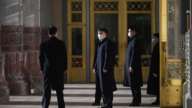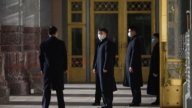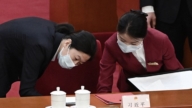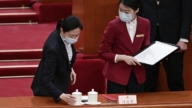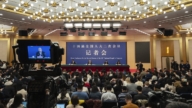【新唐人2013年03月11日訊】目前中國大陸主要的稅收規定,多源自國務院的行政性規定。長期以來,人大立法權被架空。3月8號,來自山東的全國人大代表趙冬苓的一紙議案,建議全國人大﹕2013年底前收回稅收立法授權、和稅收法律解釋權,引起了廣泛的關注。目前已有30多名人大代表聯署議案,並且表示,收回稅收立法權,是「公民」敦促人大收回立法權的一個努力。
目前,中國的十八大稅種中,僅個人所得稅、企業所得稅、車船稅這三個稅種,由全國人大立法確定了徵收權,其餘稅種的徵收合法性,源自國務院所作的暫行規定和條例,也就是行政性規定。
山東代表團部分人大代表正準備提交聯名議案,建議全國人大於今年底前,收回此前授予國務院的稅收立法權和法律解釋權。目前已有31名代表聯署。
早在2009年「兩會」期間,「上海財經大學」教授蔣洪聯合「天津財經大學」首席財政學教授李煒光,已向全國政協提出《讓稅收立法權回歸人大》的提案。蔣洪今年表示,稅收立法權回歸人大應提到議事日程上來。
蔣洪表示,如果人大當初因為改革開放的原因需要授權,這個授權應該是有時間、有範圍限制的,現在變成了沒有時間、沒有範圍限制,所有的收稅問題全部由國務院說了算,這就屬於全面的棄權。
「中央民族大學」哲學和宗教學系教授趙士林指出,中共的政治架構,權力歸誰,由最高層一言九鼎,人大沒有實權。但是通過稅收制度,把權力收回人大,讓人大真正具有包括稅收方面的立法權,這是推動政治體制改革的一個重要契機。
對於這個提案,全國人大常委會法制工作委員會副主任信春鷹回應說,「在適當的時候能夠考慮這個問題。具體沒有路線圖,也沒有時間表。」趙士林表示,這說明各方在博弈,收回立法權阻力重重。
「中央民族大學」哲學和宗教學系教授趙士林:「阻礙首先就在於利益集團。因為很多立法權下移,下移到哪裏去了?下移到政府背後的權貴那裏去了。稅收的巨大權益,最後是被他們瓜分了。所以如果人大真正是一個超越的、客觀的、孤立的立法機構,它把稅收立法權收回來,就等於堵死了權貴通過稅收來榨取民脂民膏的道路,所以從這個角度看,意義非同尋常。」
趙士林表示,稅收與國家財稅是一個國家的命脈。命脈的立法權不在人大手裡,那麼人大屬於立法機構,作為最高立法機關,權威在哪裏?權威就被架空了。
趙士林:「所以說收回徵稅的立法權,這是人大立法權落實非常重要的舉措。那麼這背後有很多利益集團要博弈,這個博弈過程非常激烈。首先,中國的所有改革,最大的阻力都在於權貴利益集團,講通俗一點,就是貪官污吏了。他們是一個一個家族形成一個一個利益集團,所有改革舉措,他們都在背後杯葛,因為傷害到他們利益。 」
趙士林認為,趙冬苓的提案,把人大立法權架空這個問題曝光了。
趙士林教授:「中國這個政治架構,它不可能擁有真正的權力。吳邦國有五不搞的,你想想他說這句話甚麼意圖?不外乎要有一個更高的、圓滑的政治權力,左右一切,包括左右人大,左右政協,所以人大和政協跟國外議會是不可同日而語的。它是我們中國特色社會主義的一個政治形式。說到底還是政治體制改革問題。人大如何真正擁有立法權,那政治體制改革就獲得一個突破。」
趙冬苓向媒體表示,不是反對收稅,是想強調「程序正義」。
而廣西代表團在9號的全團會中,全國人大常委會副秘書長李連寧也在發言中表示,稅收立法的授權收歸全國人大「已時機成熟」,建議今後新出臺的稅種,一律通過人大立法。
採訪編輯/秦雪 後製/蕭宇
NPC Delegates Call for Restoring NPS’s Legislative Power
Currently, most of mainland China’s tax regulations
are administered by the State Council.
The National People’s Congress (NPC) has been shorn
of the legislative power of taxation for a long time.
On March 8, a Shandong NPC delegate Zhao Dongling
submitted a bill on the issue.
Zhao suggested the NPC to retrieve its legislative and
statutory interpretative authority by the end of 2013.
This act has drawn wide attention in a short period of time.
Over 30 delegates have jointly signed the bill.
They state, retrieving the legislative power of taxation
is citizens’ endeavor to get back NPC’s legislative powers.
Currently, among China’s 18 tax categories, only personal
income tax, corporate income tax and vehicle and vessel tax are legally authorized by the NPC.
All the other taxes are legally authorized by temporary
regulations and rules, in other words by administrative provisions of the State Council.
Now, NPC delegates from Shandong jointly prepared a bill
suggesting the NPC retrieves its legislative and statutory interpretative authority over taxation by the end of 2013.
These powers had been “temporarily” granted
to the State Council previously.
So far 31 NPC delegates have signed the bill.
Back in 2009, during the “Two Meetings,”
similar bill was proposed by two Chinese scholars.
Jiang Hong, professor at Shanghai University of Finance
and Economics, and Li Weiguang, chief finance professor at Tianjin University of Finance and Economics,
submitted a bill titled,
“Reinstate the legislative power of taxation to the NPC.”
Jiang Hong said in 2013 that the return of legislative
authority should be brought on the drawing board.
Jiang added that if initially NPC granted the power to other
institutions due to the economic reform, there should be time and scope limits over this authorization.
Now all the taxation issues are administered
by the State Council without any time’ or scope limit.
It looks like the NPC has
permanently abandoned its power.
Zhao Shilin, professor at China’s Minzu University, remarked,
Chinese Communist Party’ (CCP) political framework and power distribution are simply determined by its top leader.
The NPC does not have any real power.
However, returning the power to the NPC through taxation
system can be an important opportunity to push forward a reform of the political regime.
This may help the NPC get real legislative power
over taxation and other fields.
The vice director of the NPC’s Legislative Affairs Commission
Xin Chunying responded to that.
Xin said, “This issue will be handled at a more proper time.
Now there is no schedule or roadmap regarding this plan.”
Zhao Shilin remarked that this response reflects
the fights of different groups on this issue.
There are still obstacles against returning
the legislative power to the NPC.
Zhao Shilin, professor at China’s Minzu University:
”The obstacles first come from all the interest groups as most legislative powers have been transferred.
Where did they go? The answer is,
all the influential officials are behind the government.
These people share the huge benefits
from the tax revenues.
If the NPC becomes a real supreme, objective,
and independent legislative institution,
and reinstates its legislative power of taxation,
the milking of Chinese people will be blocked for them.
Therefore the bill has extraordinary significance
from this point of view.”
Zhao said, tax revenue is a nation’s lifeblood. Without this
lifeblood’ legislative power how can NPC have an authority of a supreme legislative institution?
The fact is, its authority has been taken away,
Zhao adds.
Zhao Shilin: ”Reinstating the legislative power of taxation
is a key step toward realizing the NPC’s authority for real.
Many interest groups are fighting in this scenario,
and it is a very intensive game.
To start with, the biggest obstacle of any reform in China
lies in the interest groups led by influential officials, or more directly, the corrupt officials.
Each of their families forms an interest group.
These groups secretly disturb all kinds of reforms because otherwise their interests will be harmed.”
Prof. Zhao believes Zhao Dongling’ bill exposes the problem
of NPC being deprived of its legislative power.
Zhao Shilin: ”The NPC will never be granted any real power
under CCP’s political regime.
Wu Bangguo once presented the principle
of the “Five Don’ts.”
His main point is simply to have a “more supreme” power
to command everything, including the NPC and the Political Consultative Conference.
Therefore the CCP’s “Two Meetings” cannot be put on a par
with the Parliament or Congress in western countries.
They are political forms only appearing under
“the Socialism with Chinese characteristics.”
After all, this is about a political reform.
For the NPC to have real authoritative power, some
breakthrough has to be made in the political reform first.”
Zhao Dongling told the media, her bill simply brings forward
the issue of “procedural justice” and has no opposition to any tax regulation.
At a delegation meeting of Guangxi Province on March 9,
Li Lianning, NPC’s Standing Committee vice-secretary, supported the new bill proposal.
Li said, the time is ripe for the NPC to take back
its legislative power of taxation.
He suggested that any new tax should be legislated
by the NPC in the future.



